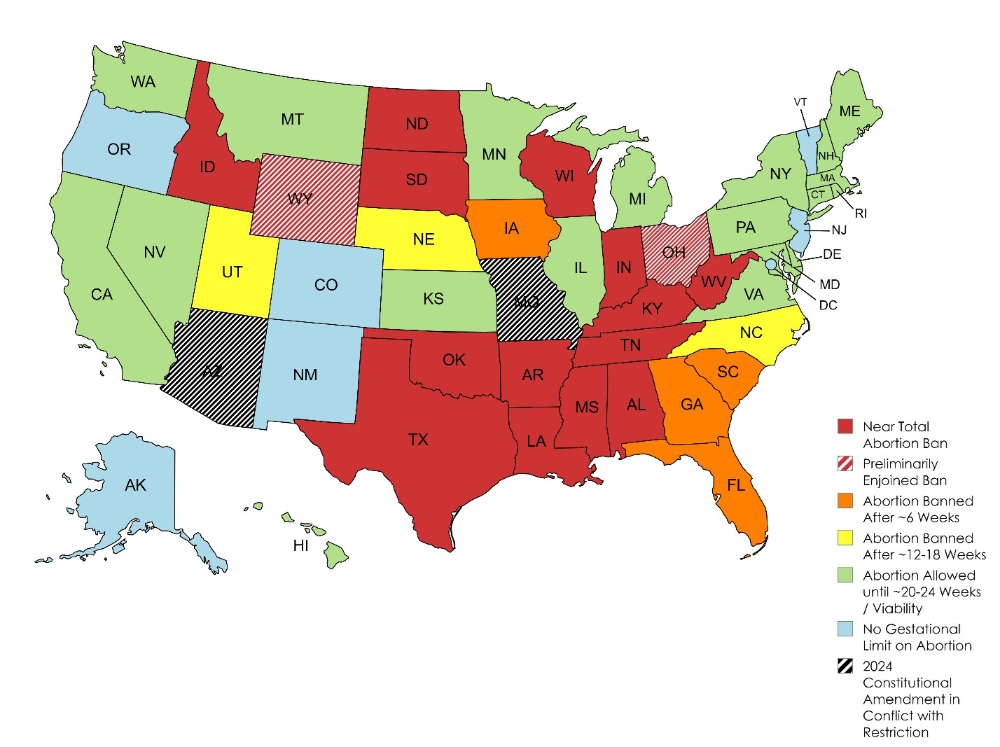- within Food, Drugs, Healthcare and Life Sciences topic(s)
- within Food, Drugs, Healthcare and Life Sciences topic(s)
- within Insolvency/Bankruptcy/Re-Structuring and Strategy topic(s)
I. Introduction
Election Day 2024 provided a mixed landscape for the future of reproductive health care in America. Like the previous state ballot measures that have overwhelmingly passed and increased access to reproductive health care since the US Supreme Court overturned Roe v. Wade, voters in seven out of the ten states decisively voted to protect and expand access to abortion care. On the other hand, Election Day 2024 also saw for the first time voters in three states declining to expand access to abortion care, and it ended with former President Donald Trump and his Vice-Presidential running mate Senator JD Vance decisively winning a second term. During the campaign, Trump made clear that his agenda for reproductive health care was to leave it to the states; however, allies of President Trump, including Vice President-elect Vance, seek to strictly enforce the Comstock Act, an 1873 anti-obscenity law, which could be weaponized and interpreted in a way to serve as a legal basis for a nationwide ban on medication abortion. At the state level, attorneys general and legislators will continue to have an important role in determining how abortion laws are enforced in their states.
This client alert provides a comprehensive update on the reproductive legal landscape post-election and provides best practices that companies and other regulated entities should consider in this new dynamic legal landscape.
II. Post Election Day 2024: Current State of Abortion Law in America
Since the Dobbs decision, several states have passed laws, through their state legislatures, severely restricting abortion access. These laws range from total abortion bans to partial bans tied to gestational age. What is more, they are frequently accompanied by laws restricting travel to obtain an abortion and investigations and prosecutions tied to abortion care. Today, abortion is restricted or entirely banned in 23 states.1
This election cycle, access to abortion was on the ballot in 10 states: Arizona, Colorado, Florida, Maryland, Missouri, Montana, South Dakota, Nebraska, Nevada, and New York. On Tuesday, November 5, 2024, ballot initiatives failed to pass in Nebraska, Florida, and South Dakota, leaving those states with a 12-week, 6-week, and near total ban respectively. At the same time, Arizona and Missouri both passed ballot initiatives to amend the state constitution to protect and expand access to abortion. The amendments will increase abortion access in Arizona from the previous 15-week cutoff, and in Missouri from the previous near-total ban, up to viability (i.e., the point at which a fetus can survive outside of the uterus, usually between 23 and 24 weeks of gestational age). Amendments constitutionalizing already existing abortion rights also passed in Colorado, Maryland, Montana, Nevada, and New York.
These added protections are in addition to the shield laws passed in several Democratic states since 2022 to prevent out-of-state investigations into reproductive care.2
The map below illustrates the current abortion laws in each state.

III. Abortion Law Under a Second Trump Administration
The new Trump Administration will bring a new set of enforcement and regulatory priorities on the federal level. Project 20253 has been presented by Trump allies and former staff as the blueprint for his agenda; Project 2025 advocates for a renewed enforcement of the Comstock Act, a federal law that could be interpreted to prohibit any medications associated with abortion from being sent in the mail.4 Under Project 2025, the Comstock Act would be strictly interpreted to prohibit the distribution of medication abortion, which has become the most common form of abortion following the Post Dobbs bans and restrictions.5 This prohibition would impact not just abortion, but also miscarriages, which are regularly treated using abortion drugs.6 Around 10–20% of pregnancies in the United States end in miscarriage, with the vast majority of miscarriages (80%) occurring in the first trimester—further underscoring that restrictions on abortion access impact broader access to reproductive healthcare.7 Project 2025 also calls for the FDA to reverse its certification of the abortion medication mifepristone entirely, and, as an interim step, to revoke guidance allowing mifepristone to be prescribed via telemedicine.
Notably, some Trump supporters view the Comstock Act—in its most extreme interpretation—as a means of imposing a nationwide ban on all abortions—not just medication abortions—without a vote of Congress. These advocates argue that the Comstock Act prohibits the mailing of any article that could produce an abortion, including medical equipment used for surgical abortions.
Republican attorneys general and prosecutors may also feel newly empowered to ramp up enforcement actions and prosecution. If this were to happen, companies may be particularly exposed to the risk of prosecution for aiding and abetting abortions. For instance, Texas legislators sent letters to Sidley Austin and Lyft, threatening them with prosecution for aiding and abetting abortions based on providing their employees abortion-related healthcare benefits and stating they would assist women in travelling to get an out-of-state abortion.8
We may also see increased activity from Democratic attorneys general. Even if abortion is limited at a national level, state privacy and consumer protection laws may provide a vehicle for Democratic attorneys general to put pressure on companies to protect reproductive rights. For example, California Attorney General Rob Bonta has repeatedly warned both tech companies and healthcare providers about potential liability, up to $250,000 per infraction, for violating the state's protections for reproductive health data.9
Companies will have to manage this conflicting legal landscape. A Democratic attorney general could leverage state law to investigate a company headquartered in their state for their behavior in a state with more abortion-restrictive laws. Or a Republican attorney general could investigate a company for providing reproductive healthcare that is illegal in their state as part of its national employee health plan. Even if jurisdictional challenges prevent these investigations from escalating to lawsuits, they will still require companies to manage the legal and reputational risk posed by the action.
IV. Increased Scrutiny and Enforcement of Reproductive Health Care and Abortion Supportive Policies
Companies should be prepared for the following actions from both state and federal actors, and their stakeholders:
- Increased scrutiny and enforcement from Republican attorneys general. For instance, in 2023, Republican state attorneys general threatened a civil suit against pharmacies dispensing mifepristone.10 Also in 2023, then-Kentucky attorney general Daniel Cameron attempted to prosecute two doctors for performing abortions when it was still legal to do so.11 We expect to see more of these types of actions from Republican attorneys general moving forward, with a sustained emphasis on medication abortion and the Comstock Act.
- State laws imposing financial penalties. We can expect state legislators in abortion-restrictive states to continue to introduce bills seeking to penalize companies for policies that arguably conflict with state law. As an example, during the last legislative session, lawmakers in Texas introduced bills that would remove tax incentives for companies that provided abortion-related funding, or would prevent local governments from doing business with such companies (even if the benefits were provided only outside the State of Texas).12
- Pressure from a company's stakeholders, such as shareholder proposals regarding abortion, and employee demands. Companies should be prepared for increased scrutiny not only from state actors, but also from their stakeholders who will be interested in the company's response to further changes in federal and state abortion law moving forward. For instance, Google employees have demanded that Google provide abortion benefits to contractors and stronger privacy for abortion-related data.13 And both Tenet and HCA healthcare have faced pressure from shareholders to detail risks of providing emergency abortion services in states with abortion restrictions.14
In response, companies should conduct a risk assessment of their reproductive health policies that support company values while minimizing risk and:
- Review employee health plans to understand and evaluate: (i) how they provide for reproductive healthcare, (ii) what employees or groups of employees are entitled to this care, and (iii) how this care is provided in various states.
- Conduct a risk assessment to identify policies and procedures that are targeted to providing reproductive healthcare that may be subject to increased scrutiny.
- Review the company's service offerings to determine business connections to providers of reproductive healthcare.
- Implement abortion-specific subpoena-response plans that are compliant with federal and state data privacy laws. As part of these plans, companies should ensure that their internal legal teams are involved and directly engaged in compliance efforts concerning abortion-related subpoenas.
Footnotes
1 15 states have near-total bans on abortion (not including 2 states with abortion bans preliminarily enjoined), 4 states ban abortion at about 6 weeks, and 4 states ban abortion after between 12 and 18 weeks. Note that while Nebraska, Arizona, and Missouri passed constitutional amendments that will ultimately change the laws in these states, the amendments themselves have not removed these laws from the books. As a result, the map does not reflect these amendments.
2 For example, in New York, health care providers who help others access a "legally protected health activity" are protected. N.Y. Crim. Pro. § 570.17. The law defines "legally protected health activity" to include "reproductive health services," including, among other things, "services, care, or products of a . . . prescribing[] or dispensing nature relating to the human reproductive system." Id. And it applies regardless of the patient's location.
3 A Mandate for Leadership, Project 2025, available at https://www.project2025.org/policy/.
4 The Comstock Act states that "[e]very article or thing designed, adapted, or intended for producing abortion . . . ; and [e]very article, instrument, substance, drug, medicine, or thing which is advertised or described in a manner calculated to lead another to use or apply it for producing abortion" to be "non-mailable matter." 18 U.S.C § 1461. It prohibits the conveyance of non-mailable matter by the US Postal Service or common carriers, such as UPS and FedEx. 18 U.S.C § 1462. Under the act, it is a felony to knowingly use or cause the use of the mail or a common carrier to deliver a nonmailable matter. 18 U.S.C § 1461. It is also a felony to knowingly take or receive a nonmailable matter that has been delivered by common carrier. 18 U.S.C § 1462.
5 In the two years since the US Supreme Court overturned Roe v. Wade, the Biden administration and Democratic states have taken steps to substantially expand and protect access to abortion. Medication abortion has become the most common form of abortion, in part due to the 2021 FDA guidance permitting prescription of mifepristone via telemedicine.
6 See American College of Obstetricians and Gynecologists, ACOG Practice Bulletin No. 200 Summary: Early Pregnancy Loss, available at https://journals.lww.com/greenjournal/abstract/2018/11000/acog_practice_bulletin_no__200_summary__early.36.aspx. According to the American College of Obstetricians and Gynecologists, the standard of care for early pregnancy loss includes offering a patient mifepristone and misoprostol (i.e., a medication abortion) to help them pass the miscarriage.
7See Cleveland Clinic Miscarriage Information Sheet, available at https://my.clevelandclinic.org/health/diseases/9688-miscarriage.
8 Texas lawmakers target law firms for aiding abortion access | Reuters
10 Republican AGs warn pharmacies against mailing abortion pills within their states | CNN Politics
12 Some Texas Republicans want to ban firms paying for abortions out of state | The Texas Tribune. None of these bills passed, however similar measures could be reintroduced during the next state legislative sessions.
13 Google workers demand abortion protections and stronger data privacy - CBS News
The content of this article is intended to provide a general guide to the subject matter. Specialist advice should be sought about your specific circumstances.






